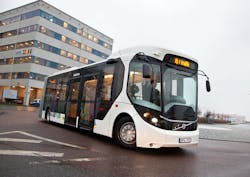Volvo Group to experiment with “electric roads”
In collaboration with the Swedish Transport Administration (STA), the Volvo Group plans to study the potential for building what it calls “electric roads,” whereby city buses can be charged with electricity from within the road itself with the bus simultaneously in full operation.
Volvo said it hopes to build a 300 to 500 meter (a roughly 984 to 1,640 foot) electric road for test operations in central Gothenburg, Sweden, sometime next year.
“Vehicles capable of being charged directly from the road during operation could become the next pioneering step in the development towards reduced environmental impact, and this is fully in line with our vision of becoming the world leader in sustainable transport solutions,” noted Niklas Gustavsson, Volvo’s executive VP for corporate sustainability & public affairs.
“With the use of an electric road, vehicle batteries would continuously be charged wirelessly during operation by transferring energy from the electricity grid to a vehicle, instead of charging the bus while it is standing still at charging stations,” he added. “The technology being studied is called inductive charging, whereby the energy is transferred wirelessly to the underside of the vehicle by equipment built into the road.”
Gustavsson said Volvo will develop a detailed proposal within the framework of innovation procurement from the STA that entails building a road section equipped with wireless charge technology and developing vehicles that will automatically charge their batteries when passing such a road section.
The road will be built along a suitable bus line in central Gothenburg and be tested for public transport, he added. “We are working on both a broad and a deep basis to develop the technology of tomorrow,” Gustavsson pointed out. “Electric roads are another important part of the puzzle in our aim of achieving transport solutions that will minimize the impact on the environment.”
About the Author
Fleet Owner Staff
Our Editorial Team
Kevin Jones, Editorial Director, Commercial Vehicle Group
Cristina Commendatore, Executive Editor
Scott Achelpohl, Managing Editor
Josh Fisher, Senior Editor
Catharine Conway, Digital Editor
Eric Van Egeren, Art Director
